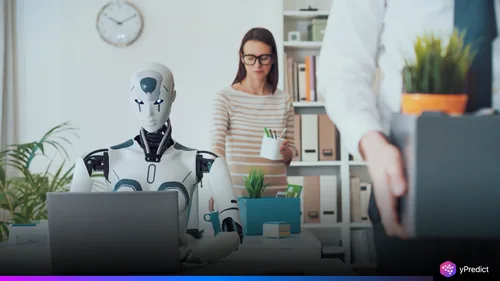
The conversation around AI and jobs has become more intense after mass layoffs in major tech companies. Headlines point to thousands of workers leaving Google, Microsoft, and IBM. Many assume artificial intelligence has directly replaced these employees. The reality is more complex and deserves closer attention.
AI is not only taking jobs, but it is also restructuring the nature of work by taking over mindless work. This transition suggests that jobs will change rather than disappear entirely and understanding this transition is important for employees, supervisors and students that want to be prepared for the future of work.
Technology has a long history of causing disruption in industries, and it spans back through all industries since the industrial revolution and the invention of computers. Existing job automation is merely an evolution of the disruption. Workers at work will have to adapt; understand that the skill in demand is switching and those who adapt to this will prosper.
Tech Layoffs Show a Bigger Picture
Fear swept across sectors when Google axed 15,000 jobs, Microsoft cut 12,000, and IBM laid off almost 9,800 workers. Many of the layoffs were seemingly linked to AI. AI is partly a tool for trimming costs, but these reductions also come at a time of wider economic pressure and follow an age of restructuring.
Companies are reorganizing around their buildings or plants to keep their administrative needs from duplicating while maintaining some semblance of efficiency and staying true to AI-driven strategies. The layoffs say that workers focused on doing the work that is repetitive or out of date are more vulnerable to automation. While this does not suggest that AI is completely replacing jobs and simply inserting machines, it does say that jobs are changing.
AI Is Taking Tasks, Not Entire Jobs
The primary distinction is in job automation. Artificial intelligence successfully executes repetitive jobs including data entry, writing a report or support in coding. Once it takes those jobs away, it allows employees to focus on creativity, strategy and human elements of a role.
For example, an HR professional can spend less time sorting resumes and more time working to build company culture. A Financial Analyst still needs analysis rather than using AI to just crunch numbers, but still provide perspective insights machines will never have. Transformation is about the balance and not elimination.
The Future of Work Will Be Hybrid
The future of work will be influenced by the partnership of humans with machines. Individuals who figure out how to use AI in their daily activities will have a more significant productivity level and potential for value creation.
Reskilling and upskilling, respectively, are the solutions to fears about AI and jobs. If employees can learn how to leverage tools within the context of their job roles, even if those roles change, they will remain relevant in companies adapting to change within every industry. It is vital that the government and companies investing in training and adaptation opportunities for workers as we move into the next cycle of challenges and innovation.
Why Adaptability Matters More Than Fear
History has shown that the answer to the inevitable disruption that comes with every wave of innovation is opportunity. The printing press, electricity, and the internet have all put people out of jobs and created new industries that use technology to create value. There is no difference with AI.
Instead of being afraid of job automation, workers should view it as an opportunity for development. It is important to stay fluid, be open to technology, and focus on the uniquely human skills we possess. If we cultivate empathy, creative thinking, and critical thinking (skills that AI can assist with but cannot take the human element out of for problem-solving and a leadership perspective), we will succeed.
Final Thoughts
Discussion about AI and jobs does not reflect machines vs. human beings; it is about how tasks change and develop over time. Layoffs and staff reductions by tech giants reinforce the case that we must adapt to the pace of change, but also highlight that human creativity and strategy are dynamic, not replaceable.
AI is not the death of work; it is the next iteration of how we work. By prioritizing skills, adaptability and capacity for growth, workers will transform unknowns and gaps into opportunities. The future of work may belong to those who learn, grow and collaborate with AI.






